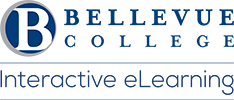Date: TBD
Participant: Any employee of Bellevue College
PD Hours: On completion participants receive 20 hrs of professional development time.
Accessibility 101: The Basics of Inclusive Design
Course Overview
The purpose of this course is to introduce participants to the basics of accessibility, with emphasis placed on making content accessible while promoting proactive (as opposed to reactive) steps that people can take to create and advocate for accessible content. Participants will learn the language of accessibility, the laws that most impact higher ed, how to create accessible content, the principles of Universal Design for Learning, and other useful information pertaining to accessible technology and the experience of people with disabilities.
Course Objectives
- Explain the importance and benefits of accessible/inclusive design.
- Summarize the laws that protect people with disabilities in institutions of higher ed.
- Differentiate between access and accommodation.
- Employ Universal Design for Learning principles to design a lesson.
- Create simple accessible documents, Canvas pages, PDFs, and/or PowerPoint presentations that include the following:Use of headings and style guide
- Alt-text for images
- Descriptive hyperlinks
- Accessible tables
- Identify and use the various approaches to caption a video.
- Take steps to ensure online technology is accessible to students, faculty, and staff on your campus.
Assignments & Assessments
Following the lessons in each module, you will be given a variety of self-check activities and a selection of module assessments to choose from. Check Your Understanding activities are graded, but you have two opportunities to complete them, which allows you to seek additional support if you need it in order to try again.
Most modules have options to select from for the module assessment. The module assessment options vary in what they require, allowing you to determine the best and most relevant way to demonstrate your understanding of the material. If you complete all three assessments, the highest two grades will be the ones that count towards your final grade.
- The goal of this course is to enhance your comfort with, and knowledge of, creating accessible content.
- To pass the course, you need to score 85% or higher on the activities and (Option-Not required) have a meeting with an instructional designer.
Grade Policy
You are responsible for checking your own grade. Please click Grades from left navigation menu to see your grade and my comments.
Grades are weighted. The distribution is as follows:
- Module 1 Assessment: 25% – Required: Module 1 Quiz
Select one of the following:
Option A: UDL Instructional Strategies
Option B: UDL Assignment/Activity
- Module 2 Assessment: 25%
Select two of the following:
Option A: Module 2 Quiz
Option B: MS Word Assignment
Option C: PPT Assignment
- Module 3 Assessment: 25%
Select two of the following:
Option A: Module 3 Quiz
Option B: Canvas Page
Option C: Captioned Video
- Remaining Activities: 25%
Introduction Discussion
Check Your Understanding: Access or Accommodation?
Check Your Understanding: Principles of UDL
Check Your Understanding: Accessible Documents
Check Your Understanding: Accessible PPT
Check Your Understanding: Canvas Pages
Your Accessibility Action Plan
Since people work at different paces, we will do our best to grade all assignments within one business day.
There are two Extra Credit opportunities. For each one that you successfully complete, one point will be added to your final overall grade.
Course availability
This is a 6-week course that starts during a quarter. Assignment due dates are listed for each assignment at the bottom of the Syllabus page.
Assignment due dates allow us to set a pace for the course. However, to avoid managing requests for extensions, we do allow for you to submit assignments late. Please note that submitting assignments after the due date may result in a delay in grading, as we may be busy grading another assignment. You may turn in late assignments through Wednesday, when the course officially closes.
The course and all of its resources will remain open and available to you well beyond the course dates.
Facilitators
Betsy Zahrt Geib
Instructional Designer, eLearning, Bellevue College
George Rowe
Instructional Designer, eLearning, Bellevue College
Communication
- Our messages to you:
Please check Announcements from left navigation frequently. We will communicate with the participants through Announcements, not Canvas messages.
Please check our comments with your grade. We never give “0” point without explanation and advice. - Your messages to us:
If you have any questions about the course, please post them in the Course Q&A Discussion Forum. We’ll be checking the forum frequently. If other class members know the answer to your question(s), they should feel free to respond. We prefer to communicate through the forum since it is important for the entire class to see all conversations related to course materials and activities. You will get a quicker response when you post a question to a forum as we check them more frequently than e-mail. If you email us questions about the course we will post the response in the discussion for everyone to see, as opposed to communicating the response to only you. - For questions about your individual grade/submissions, etc, you can email the facilitator responsible for that module. We will respond to your email messages within 24 hours (Monday through Friday). For example; if you email one of us at 3 p.m. on Friday, we will respond before 3 p.m. on Monday.
Workshops offered by eLearning in Fall 2021:
- Monday, October 4: Canvas 101: Teaching with Canvas
- Monday, October 4: Copyright Information for Educators
- Winter 2022: Accessibility 101: The Basics of Inclusive Design
- Winter 2022: Canvas 201: Taking your Course to the next level!
Information: This workshop is facilitated by Bellevue College’s eLearning team.
A completion certificate will be provided.
Unless otherwise stated, course content is designed and provided by SBCTC eLearning and Open Education, CC BY 4.0
Last Updated February 8, 2023
